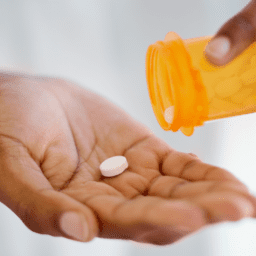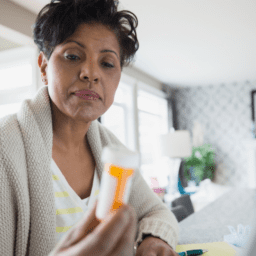In this Live Well Today webinar recording, Dr. Soania Mathur interviewed Dr. Michael Okun about emerging therapies for treating Parkinson’s. We are pleased to present a new iteration of this discussion: Dr. Mathur and Dr. Okun also discussed innovations in Parkinson’s care in 2022 and 2023.
During this year’s conversation, Dr. Okun offered his perspective on developing therapies including infusion levodopa, combination therapies, non-motor symptoms, advanced DBS, cell replacement therapies, and more!
An audio version of this webinar is available.
Webinar NOTES
Early in the webinar, Dr. Okun offered an important piece of advice: Ask your care team about new developments in Parkinson’s treatment and research at every visit.
We love this suggestion: Physicians tend to be busy, and some may not prioritize reading of current research. When you ask what they think about recent research, it shows you are interested in the latest developments and may inspire them to be more diligent in keeping you informed.
COMBINATION THERAPIES
Many people with Parkinson’s already take combination therapies, but there are developments in this realm about which Dr. Okun expressed particular interest.
Simply put, combination therapies are when you use multiple treatments to improve efficacy. The most common example today is using levodopa with another medication to extend ON time; for example, by adding a COMT-inhibitor, dopamine agonist, or MAO-B inhibitor.
Dr. Okun calls combination therapies “the next chapter” in Parkinson’s care because of recent efforts from researchers focusing on treatment targets other than those in the dopamine system. These include treatments focused on cannabinoid receptors and the receptors targeted by GLP-1R agonists, which are discussed below. Combination therapies may have particular benefits for non-motor symptoms.
CONTINUOUS INFUSION LEVODOPA
Dr. Okun believes that the most significant new treatment on the immediate horizon is continuous subcutaneous infusion levodopa.
While the Duopa™ system has been available in the United States since 2015 for infusion of levodopa into the intestines, two devices that directly infuse levodopa into the skin are in the final stages of review by the FDA in the United States and may be approved before the end of the year. In fact, these treatments are already available in some parts of the world.
Subcutaneous infusion levodopa systems deliver a continuous supply of levodopa via a pump device. The main benefit seen in clinical trials for these systems has been increased ON time, but there may be other benefits, too (i.e., relative to dyskinesia). Additionally, compared to Duopa, these new systems may have lower risks of complication because they do not involve tubes and connections that go as deeply into your body.
Trials for one of these drugs, developed by AbbVie, have found the following key outcomes:
- Sustained improvements in ON time (an average of as much as 2.72 hours daily) without dyskinesia
- Improvements relative to morning akinesia, sleep quality, and quality of life
Trials for the other of these drugs, developed by Neuroderm, have found the following key outcomes:
- An average increase of up to 1.72 hours of “good” ON time
- Low rate of withdrawal of participants from the study
While the trials for these new treatments reported low incidence of serious side effects, there are some risks of skin irritation and potentially nodules that develop under the skin at the injection site. Infections are also possible, which can become serious.
CELL REPLACEMENT AND REGENERATIVE THERAPIES
Cell replacement and regenerative therapies for Parkinson’s (sometimes referred to as “stem cell” therapies) are in clinical trials around the world, and some recent trials have shown promising results.
While early results are promising, very few people with Parkinson’s have received these types of treatment, and much more data about safety and efficacy is needed before these treatments will be broadly available. In fact, so little is certain about cell replacement therapy for Parkinson’s that, from Dr. Okun’s perspective, it remains to be seen whether it is appropriate to consider them disease-modifying or symptomatic.
There is still reason to be excited about these treatments. For one thing, even if they are not found to be disease-modifying, they may provide symptomatic benefit for years with only a single treatment. Dr. Okun also expressed excitement that leading cell replacement experts recently wrote about new potential benefits of this type of treatment: targeting cognitive effects of Parkinson’s by using cell replacement technology in different parts of the brain.
It’s important to note you may see cellular replacement or regenerative therapies marketed, but these are not approved by the FDA. Receiving these therapies outside of a clinical trial is not presently advisable. Blue Rock Therapeutics and Aspen Neuroscience are two companies moving forward with clinical trials in this area.
EXENATIDE PHASE III AND OTHER GLP-1R AGONISTS
GLP-1R agonists have been all over the news in recent years. Interest in these drugs as therapies for Parkinson’s began over a decade ago.
One reason for the excitement for these drugs relative to Parkinson’s is that people who took exenatide–a drug from this class–for diabetes had a lower incidence of developing Parkinson’s than the general public. This was an interesting finding because people with diabetes tend to be at an elevated risk for developing Parkinson’s compared to the general population.
Since these trials started, multiple drugs in this class have been researched, but exenatide has advanced to a phase III trial, the results of which are due later this year. Dr. Okun provides an overview of exenatide research in the recording above, and here are some links describing exenatide’s development so far:
- Cure Parkinson’s Resource for Phase III trial
- Science of Parkinson’s Post on Exenatide: An Exercise in Expectations
- NLY-01 Trial—Our Blog Post about a US-Based Exenatide Trial with Mixed Results
Other GLP-1R agonists that have been researched include liraglutide and lixisenatide. In the interview, Dr. Okun referred to lixisenatide when he references forthcoming exenatide-related news. Here is the lixisenatide phase II trial report, published on April 3, 2024.
We echo Dr. Okun’s caution about not rushing out to pursue use of these medications until conclusive research is released. In exenatide’s case, this could be within the next few months. In the meantime, we’ve written a blog post about drug repurposing and off-label medication use in which you may find value.
ADAPTIVE DEEP BRAIN STIMULATION
Adaptive deep brain stimulation (aDBS) systems sense brain activity and adjust DBS stimulation settings in response.
Dr. Okun observed that this technology is worth considering for many, but he also noted that aDBS may not be necessary or provide a significant improvement over other DBS systems. He advised that the most important factor is the experience of the team performing your DBS, because the best data we have suggests that optimal DBS lead placement remains critical to positive outcomes.
Transcranial Magnetic Stimulation
While transcranial magnetic stimulation (TMS) is not discussed in the interview, there was an active conversation about it in the chat during the webinar.
Zhang et al. completed a meta-analysis of the existing research about TMS in 2022. In short, the treatments seem safe, but efficacy data is not sufficient to recommend the use of this therapy at present—especially in consideration of the cost to have the procedure. Because the treatment is not FDA approved for Parkinson’s, it is unlikely to be covered by insurance.
ADDITIONAL RESOURCES
Primer on Parkinson’s Medications
Charco Neurotech Makers of Cue1
Davis Phinney Foundation Podcast Discussing Addiction, Including to Nicotine
Davis Phinney Foundation Deep Brain Stimulation Resources
Deep Brain Stimulation Stories
Speaker Bios
 Michael Okun, MD
Michael Okun, MD
Executive Director of The Norman Fixel Institute for Neurological Diseases
Dr. Michael Okun received his medical degree with honors from the University of Florida. He is a practicing neurologist, professor, and executive director of the Norman Fixel Institute for Neurological Diseases at the University of Florida Health College of Medicine. He is a co-author of Ending Parkinson’s, Living with Parkinson’s Disease and Parkinson’s Treatment: 10 Secrets to a Happier Life.
Soania Mathur, MD
Physician and Parkinson’s Advocate
 Dr. Soania Mathur is a physician in Canada who resigned her clinical practice 12 years after her diagnosis of young onset Parkinson’s at age 28. Now a dedicated speaker, writer, educator, and Parkinson’s advocate, Dr. Mathur is the founder of UnshakeableMD and a co-founder of PD Avengers.
Dr. Soania Mathur is a physician in Canada who resigned her clinical practice 12 years after her diagnosis of young onset Parkinson’s at age 28. Now a dedicated speaker, writer, educator, and Parkinson’s advocate, Dr. Mathur is the founder of UnshakeableMD and a co-founder of PD Avengers.
















